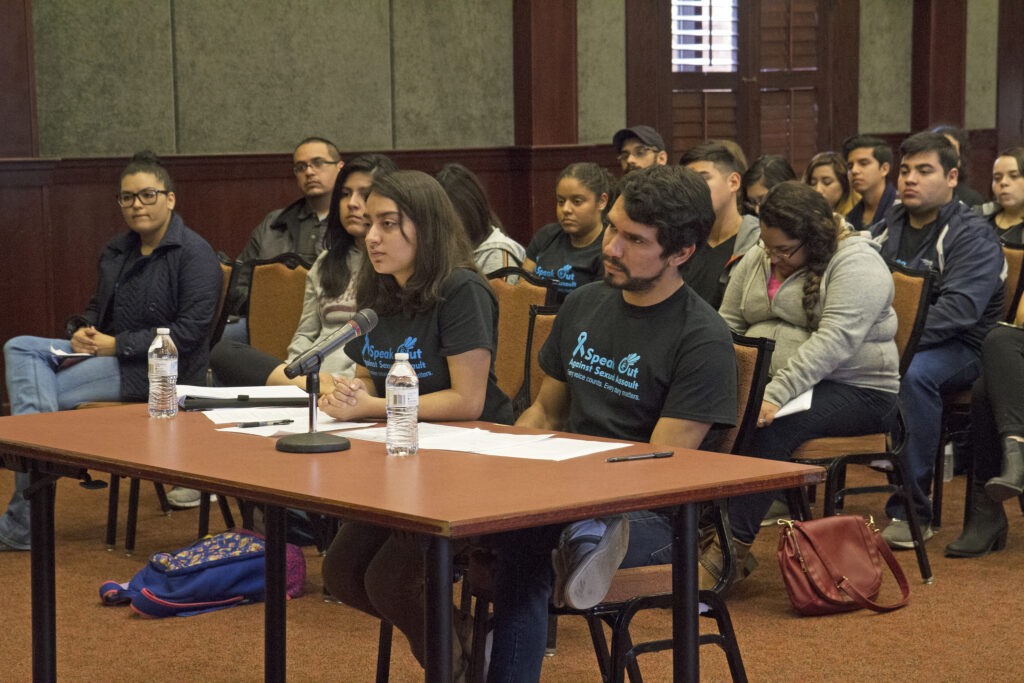- South Texas Students Meet Accordion Music Icons Los Tigres Del Norte In Edinburg Thanks To Khs America/Hohner Alianza Académica Initiative
- Fragile Planet Offers a Nighttime Wildlife Experience
- Falcons Soccer Off & Running
- Cameron County Receives Funds to Improve Two Parks
- Falcons Complete First Half of 32-6A
- School District to Help out Victims of California Wildfires
- Sand Castle Days Continued Despite Unexpected Weather
- Ready for District
- Discussion of Garbage Dumpster Rates, Agreements Between State & City on Highway Regulations, and More
- 31st Annual Shrimp Cook-Off is Right Around the Corner
Communication Students Address Sexual Assault, Rape Prevention at Gender Comm Expo
- Updated: December 11, 2015
by Vicky Brito
BROWNSVILLE, TEXAS – Sexual assault and rape are difficult topics for discussion for many people. But the communication department at The University of Texas Rio Grande Valley got the conversation going in Brownsville on Wednesday, during the Gender Comm Expo for the Prevention of Sexual Assault and Harassment.
Dr. John Cook, associate professor and chair of the UTRGV Communication Department, said the goal of the event was to spread awareness through a difficult dialogue event.
Difficult dialogue events promote religious, cultural and political pluralism, he said, as well as academic freedom on campuses.
“Sexual assault is not a crime of passion, it is a crime of violence,” Cook said. “Our event is about the awareness and prevention of sexual assault.”
The event began with a free speech alley held on the Main Patio. Students had a two-minute platform to speak on the issue.

Ann Jacobo, left, and Esai Torres moderated the Prevention of Sexual Assault and Harassment panel discussion on the UTRGV Brownsville campus. UTRGV Communication junior Danielle Banda, seated far left, addressed some of the misconceptions associated with sexual assault and rape. Photo: Veronica Gaona/UTRGV
Senior English major Kendall Banda and junior psychology major Brisa Gonzalez presented facts and statistics on sexual assaults on college campuses:
- About 20 percent of women and 4 percent of men will be sexually assaulted while attending an institution of higher education.
- The assailant is more often than not someone the victim knows.
- An estimated one-third of people who were sexually abused as children will be assaulted as an adult.
- About 32,000 pregnancies occur as a result of rape.
- Most of these crimes often go unreported.
Danielle Banda, a UTRGV junior communication major, shared some common misconceptions about sexual assault and rape, and stressed that assailants will use a variety of manipulation tactics to commit their crime.
“People make statements like, ‘Look at the way she is dressed. Or, look how much she drinks. She’s asking for it.’ Those are false statements,” Banda said. “No one asked to be abused, injured or violated.”
The second part of the event continued in Salón Cassia, where a five-person panel answered questions about rape and sexual assault posed by student communication major moderators Ann Jacobo and Esai Torres.
The panel consisted of UTRGV Chief of Police Raul Munguia; Associate Professor of Philosophy Cynthia Jones; Valley Baptist Medical Center Forensic Nurse Examiner Laura Dominguez R.N.; UTRGV Director of the Office of Institutional Equity and Title IX Coordinator Alicia Morley; and Cameron County Assistant District Attorney Omar Saenz.
Munguia fielded the first question, which was about the number of sexual assault and rape cases during the school year at UTRGV.
“The numbers are mostly very low,” he said. “However, one of the things that we don’t track are assaults occurring outside of our jurisdiction. That is an issue and a challenge that we have.”
Munguia then was asked what steps a student should take to report an assault.
“If a victim is not comfortable with calling the police department, there are other avenues they can use,” he said.
A good alternative is to contact Student Health Services, or Student Rights and Responsibilities.
Moderators asked panelist Jones what steps an individual can take to prevent sexual assault or rape.
“I think that is a bad question,” Jones said, because the problem is with the rapist, not the victim.
“If you get assaulted, it’s not your fault,” she said. “We need to address the people who rape.”
Panelist Dominguez stressed the importance of seeking medical attention quickly after a sexual assault, and cited a 96-hour window for gathering medical evidence after a sexual assault or rape.
“There are studies that say maybe 120 hours, but the sooner the better,” she said.
ADA Saenz spoke to the long-term impact on the victim, and encouraged reporting rapes so the process of healing can begin.
“The number of ways it effects your life is major,” Saenz said. “I think what we can do as a panel, and as a service to young people, is to inform you.”
Saenz said many do not know what “consent” is; he defined it as two individuals who make a rational decision.
“I just want you all to make smart choices, and that is the whole point,” Saenz said.
